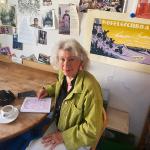The longest castle in the world towers over colourful town houses. It is full of stories and secrets. One floor below, the picture-perfect city on the Salzach enchants its visitors with a rich cultural offering, culinary delights and casual flair. Text: Anja Keul, Fotos: Angelika Jakob
Things to Do in Burghausen with its World-Longest Castle
Most visitors to Burghausen Castle hardly spare the knights, noblewomen and dignitaries a glance at first. Their destination is the panoramic terrace at the very top of the “Palas”, the former residence of the once powerful Lower Bavarian dukes.
What a view! On the left, just below the complex, the Salzach – which also forms the border to Austria – meanders in a milky green hue. On the right, Wöhrsee lake shines like an emerald, guarded by the sturdy “Pulverturm” tower. And when you turn around, the skyline comprising several chemical factories on the horizon reminds you to whom Burghausen, which became rich through the salt trade, owes its prosperity today.
Making Your Way Through the Castle Wearing a Traditional “Wulsthaube”
Dressed in linen robes and with a traditional medieval bonnet on her head, city guide Katrin Scheitz begins an exciting journey through time in the castle complex. Five forecourts form the overture to the main castle with its top-class museums.
From the “Rentschreiberei”, where the income from the salt trade was administered in the Middle Ages, the tour passes the former homes of craftsmen and court officials, the late Gothic Hedwig’s Chapel, the Witches’ Tower and the Torture Tower, to the entrance to the main castle with the gatekeeper’s room, from where access was strictly controlled. “Although ...”, Katrin smiles, “many things point to a secret path through which some ladies and gentlemen were able to smuggle themselves past the guards; it possibly even ran under the Salzach!”
After roughly an hour in the “Palas”, Katrin and her group have walked a solid kilometre through the longest castle in the world – which is what Burghausen’s medieval fortress has officially been called since it was entered in the Guinness Book of Records in 2009.
Flowerbeds, rose vines and flowering perennials line the walk through the grounds high above the city. Beautiful but steep paths lead directly down. In the main castle’s inner courtyard, new paths made of flattened stones were laid out a few years ago around the old paving, which can also be easily negotiated by prams and wheelchairs.
Photo Motifs at Their Best
Burghausen is much more than just a castle
The longest castle in the world – that naturally brings with it international renown. And such perfectly-styled Italian women, cheerful Saxons in freshly acquired “lederhosen”, or platinum blond Latvians with the ever-popular straw hat on their heads pose in front of the superb backdrop.
The views of the pastel-coloured houses on the town square deep below offer plenty of opportunities for spectacular photos. Or up to the 79-metre-high, double-laced baroque onion dome of the parish church of Sankt Jakob: it is only a few metres higher than the castle roof. Where else can you get so close to a church spire?
But Burghausen is much more than just a castle. Down in the old town, you can enjoy a relaxed stroll along small, owner-run shops. One of the oldest there is the Dirndlmanufaktur Stephan Barbarino, founded in 1824 in a stately townhouse as a general shop. The heavy wooden counter at which Julia Barbarino advises her customers still dates from this time. Tailors work in the back rooms, some of whom have been in the business for decades, making everything from aprons to blouses on the spot to go with the simple, beautiful Barbarino dirndls – a traditional dress from the region.
Burggeist and Waldrapp
Burghausen’s flagship street “In den Grüben” begins a few steps further on. The charming houses, some of which lean against each other a little crookedly, once housed workshops. Today, the entire ensemble is a listed building. Jochen Kuntz has set up his “Geistreich” distillery at number 145 and, in the absence of a real ghost in the world’s longest castle, distils the “Burghauser Burggeist” from apples, pears, plums and strawberries.
At number 126, Andrea Dietzinger sells antiques and colourful junk. In the shop window of number 161, there is not only art and jewellery made of glass, but also plenty of strange-looking birds: black, shaggy, with a long, curved beak and a mop of feathers on the neck. Glass artist Oliver Habel actually studied zoology, and is passionate about the EU project to reintroduce the hermit ibis, a migratory bird that is almost extinct in Central Europe.
With a bit of luck, you can see the curious birds from about April to August on the Weir wall near the “Pulverturm”, below which lies their strictly protected breeding colony. In Habel’s shop, this particular bird is present on postcards and shaped out of glass.
Jazz Week with the Heavy Hitters
I love the sound in the cellar very much; even in the back, you can hear very well
Behind house number 193, the brick-red “Mautnerschloss” (which once served as a customs office for the salt trade), lies the epicentre of Burghausen’s jazz tradition. The “Jazzclub im Keller” is legendary, as is the International Jazz Week, held every year in March since 1970.
“I really like the sound in the cellar; even at the very back, you can hear very well,” says saxophonist Wolfgang Hanninger, who took part in one of the summer jazz courses in Burghausen in the late 90s and now teaches there himself.
Burghausen’s Jazzy Street of Fame
Right in front of the entrance to the Mautnerschloss, two bronze plaques embedded in the floor recall the beginnings of jazz in Burghausen. One, still brand new and spick and span, is dedicated to Joe Viera, the festival’s co-founder. The other bears the name of Ella Fitzgerald, who performed in the town of 18,000 inhabitants in the mid-1970s, as did Oscar Peterson and Count Basie.
Since 1999, the Street of Fame (In den Grüben) has honoured the international jazz greats, who have already paid their respects in Burghausen, with 42 bronze plates. On the interactive jazz walk, you learn many anecdotes about the stars (from the spontaneous jam session with local “Schuhplattler” to the endless concert, to beat jetlag) and hear plenty of great music. The tour starts at the GPS column on the town square.
With the “Plätte” on the Salzach
The heart of Burghausen beats on the town square. People meet at the tables in front of the Hotel “Post” or on the terrace of the Strizzi restaurant, which only opened in 2021 and serves Mediterranean-Levantine cuisine. The buses to Tittmoning also start at the town square, where the “Plättenfahrt” begins. In the Middle Ages, the “white gold” was shipped on the flat boats from Hallein near Salzburg via Burghausen, and partly to the Black Sea.
Today, Georg, the skipper, steers the barge, which is filled with fifty holidaymakers, along the Salzach almost daily during the on-season. On the public trips held every Sunday, the five-piece band “Die Brasshüpfer” or another music group sometimes finds a place on board and sets the mood with Dixie and Swing.
For about one and a half hours, the boat, with a draught of only 30 centimetres, glides along with the current of the Salzach, past Raitenhaslach Monastery, the most important excursion destination in the vicinity of Burghausen. Even those who only want to visit the beautiful monastery beer garden should pay a visit to the lavishly decorated monastery church, a homage to the transition from late Baroque to Rococo.
The Polish king’s daughter, Hedwig, who lived for many years at Burghausen Castle and whose marriage to the Lower Bavarian Duke Georg gave rise to the famous “Landshut Wedding”, is also buried there.
The Burghausen Castle Festival complete with camp life, medieval music and many attractions in the second week of July, an event held every year, does not have to fear comparison with the other well-known Lower Bavarian spectacle.
Omm on the Salzach and SUP on Lake Wöhrsee
This trip will make you want to explore the banks of the Salzach on your own. The best place to do this is on the Austrian side. A narrow path along beech forests and ferns leads to the Inn-Salzach break point.
Depending on the water level, small, grey-white sandy beaches form here. Jackdaws, bats and eagle owls live in the steep slopes just before the Salzach flows into the Inn. A wildly romantic place, just right for reviewing your experiences with a view of the gently gurgling Salzach.
That leaves the “Wöhrsee”, this jewel of a bathing lake below the castle. Long, narrow and calm, it is particularly suitable for leisurely SUP paddling tours, and for swimming; it is often pleasantly warm as early as June. The extensive sunbathing lawns found here, which opened in 1934, invite you to relax under old trees, and it never gets too crowded here.
Immerse Yourself in the Middle Ages
In the afternoon, why not go up to the castle again and immerse yourself in the Middle Ages? In the State Castle Museum located in the “Palas”, some fantastic, monumental works tell of knightly battles and courtly life. In the interactively designed City Museum you can try out material transport in the “hamster wheel” using your own physical strength, or try to knock your opponent off his horse in the digital jousting tournament – great fun for children too!

